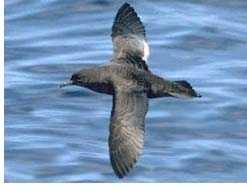Mark Carey (Department of Environmental Management and Ecology, La Trobe University, Wodonga, Australia), writing in the journal Wildlife Research has looked at effects of GLS loggers on Short-tailed Shearwaters Puffinus tenuirostris.
The paper's abstract follows:
"Context: Attaching tracking devices to several avian species could produce negative outcomes. Of particular concern are potential alterations to birds' reproductive, flight, diving and foraging performances. Attachment of devices may also lead to a bias in results or an inaccurate interpretation of results as birds may not behave ‘normally'.
Aims: The aims of the present study were to evaluate the possible effects of a 5.4-g global location-sensing (GLS) data-logger attached to a modified aluminium band on short-tailed shearwaters (Puffinus tenuirostris (Temminck, 1835)), representing 0.7-1% of adult body mass, breeding on Great Dog Island, Furneaux Group, Tasmania.
Methods: Eighty birds were monitored during two breeding seasons. Twenty-seven GLS data-loggers were attached to birds in 2007, with the remaining birds acting as controls. Breeding success, return rates and body condition were compared between equipped and non-equipped birds.
Key results: In the year of deployment, no evidence of negative effects of attaching data-loggers on hatching success, pre-fledging chick mass or survival was found. However, chicks reared by non-equipped adults were skeletally larger. After controlling for body size, no significant effect on chick body condition was detected between the two groups. In the year of recapture, significantly more GLS-equipped than non-equipped adults returned to the colony. There were no differences in adult body condition, egg size, hatching or fledging success between the two groups. After GLS devices were removed, chick mass and size at pre-fledging were equal between those raised by GLS-equipped and non-equipped adults.
Conclusions: These results suggest that appropriate-sized data-loggers are a relatively benign method of obtaining at-sea foraging and behavioural information from seabirds. However, loggers may be affecting parental care of offspring and this requires further investigation. Importantly, no carry-over effects were observed once the data-loggers were removed after 12 months.
Implications: Identifying any effects of data-logger attachment is imperative for animal welfare but also for the accuracy of tracking data and subsequent interpretation. GLS devices are rapidly becoming smaller and lighter, and if this trend continues, unlock unprecedented opportunities for pelagic seabird research. During long deployments, monitoring individuals and assessing their health and reproductive output should be considered an integral part of all bio-logging studies."

Short-tailed Shearwater. Photograph by Mark Carey
Reference:
Carey, M. 2011. Leg-mounted data-loggers do not affect the reproductive performance of short-tailed shearwaters (Puffinus tenuirostris). Wildlife Research 38: 740-746.
John Cooper, ACAP Information Officer, 14 October 2012

 English
English  Français
Français  Español
Español